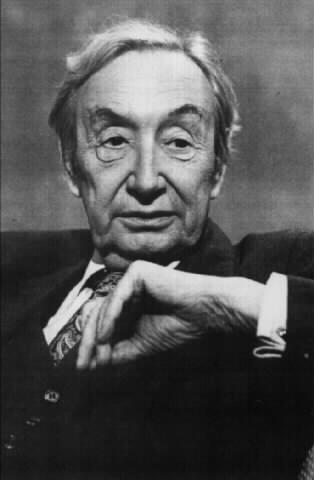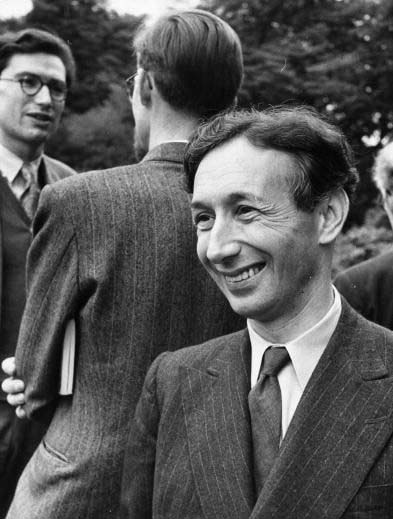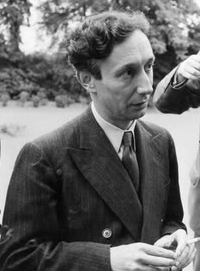<Back to Index>
- Philospoher Alfred Jules "Freddie" Ayer, 1910
PAGE SPONSOR



Sir Alfred Jules "Freddie" Ayer (29 October 1910 – 27 June 1989) was a British philosopher known for his promotion of logical positivism, particularly in his books Language, Truth, and Logic (1936) and The Problem of Knowledge (1956).
Ayer was a Special Operations Executive and MI6 agent during the Second World War. He was the Grote Professor of the Philosophy of Mind and Logic at University College London from 1946 until 1959, when he became Wykeham Professor of Logic at the University of Oxford. He was president of the Aristotelian Society from 1951 to 1952. He was knighted in 1970.
Amongst British philosophers of the 20th Century he has been ranked as second only to Bertrand Russell.
Ayer was born in St John's Wood, London, to a wealthy European family. His mother, Reine Citroën, was from the Dutch Jewish family who founded the Citroën car company in France. His father, Jules Ayer, was a Swiss Calvinist financier who worked for the Rothschild family.
He was educated at Ascham St Vincent's Preparatory School and Eton. It was at Eton that Ayer first became known for his characteristic bravado and precocity. In the final examinations at Eton, Ayer came second in his year, and first in classics. In his final year, as a member of Eton's senior council, he unsuccessfully campaigned for the abolition of corporal punishment at the school. He won a classics scholarship to Christ Church, Oxford. He served as an officer in the Welsh Guards during World War II, working for the Special Operations Executive (SOE) and spying for MI6. He was an extrovert, social mixer and womanizer, and was married four times, including to Dee Wells and Vanessa Salmon (thus becoming stepfather to Nigella Lawson). Reputedly he liked dancing and attending the clubs in London and New York. He was also obsessed with sport: he had played rugby for Eton, and was a noted cricketer and a keen supporter of the Tottenham Hotspur football team. For an academic, Ayer was an unusually well connected figure in his time, with close links to 'high - society' and the establishment. Presiding over Oxford high tables, he is often described as charming, but at times he could also be intimidating.
In Language, Truth and Logic (1936), Ayer rejected atheism, as he understood it, on the grounds that any religious discourse was meaningless. He believed that religious language was unverifiable and as such literally nonsense. Consequently "There is no God" was for Ayer as meaningless and metaphysical an utterance as "God exists." Though Ayer could not give assent to the declaration "There is no God," he was an atheist in the sense that he withheld assent from affirmations of God's existence. However, in "Language, Truth and Logic" he distinguishes himself from both agnostics and atheists by saying that both these stances take the statement "God exists" as a meaningful hypothesis, which Ayer himself does not. He also criticizes C A Mace's opinion that metaphysics is a form of intellectual poetry. The stance of a person who believes "God" denotes no verifiable hypothesis is sometimes referred to as igtheism (for example, by Paul Kurtz). In later years Ayer did refer to himself as an atheist and stated that he did not believe in God. He followed in the footsteps of Bertrand Russell by debating with the Jesuit scholar Frederick Copleston on the topic of religion.
Between 1945 and 1947, together with Russell and George Orwell, he contributed a series of articles to Polemic, a short lived British "Magazine of Philosophy, Psychology, and Aesthetics" edited by the ex - Communist Humphrey Slater.
Ayer was closely associated with the British humanist movement. He was an Honorary Associate of the Rationalist Press Association from 1947 until his death. He was elected a Foreign Honorary Member of the American Academy of Arts and Sciences in 1963. In 1965, he became the first president of the Agnostics' Adoption Society and in the same year succeeded Julian Huxley as president of the British Humanist Association, a post he held until 1970. In 1968 he edited The Humanist Outlook, a collection of essays on the meaning of humanism.
He taught or lectured several times in the United States, including serving as a visiting professor at Bard College in the fall of 1987. At a party that same year held by fashion designer Fernando Sanchez, Ayer, then 77, confronted Mike Tyson who was forcing himself upon the (then) little known model Naomi Campbell. When Ayer demanded that Tyson stop, the boxer said: "Do you know who the fuck I am? I'm the heavyweight champion of the world," to which Ayer replied: "And I am the former Wykeham Professor of Logic. We are both pre-eminent in our field. I suggest that we talk about this like rational men". Ayer and Tyson then began to talk, while Naomi Campbell slipped out.
In 1988, shortly before his death, Ayer wrote an article entitled, "What I saw when I was dead", describing an unusual near - death experience. Of the experience, Ayer first said that it "slightly weakened my conviction that my genuine death ... will be the end of me, though I continue to hope that it will be." However, a few days later he revised this, saying "what I should have said is that my experiences have weakened, not my belief that there is no life after death, but my inflexible attitude towards that belief".
In 2001 Dr. Jeremy George, the attending physician, claimed that Ayer had confided to him: "I saw a Divine Being. I'm afraid I'm going to have to revise all my books and opinions." Ayer's son Nick, however, said that he had never mentioned this to him though he did find his father's words to be extraordinary, and said he had long felt there was something possibly suspect about his father's version of his near death experience.
Ayer is best known for popularizing the verification principle, in particular through his presentation of it in Language, Truth, and Logic (1936). The principle was at the time at the heart of the debates of the so-called Vienna Circle which Ayer visited as a young guest, and others including the leading light of the circle, Moritz Schlick were already offering their own papers on the issue. Ayer's own formulation was that a sentence can only be meaningful if it has verifiable empirical import, otherwise it is either "analytical" if tautologous, or "metaphysical" (i.e., meaningless, or "literally senseless"). He started work on the book at the age of 23 and it was published when he was 26. Ayer's philosophical ideas were deeply influenced by those of the Vienna Circle and David Hume. His clear, vibrant and polemical exposition of them makes Language, Truth and Logic essential reading on the tenets of logical empiricism – the book is regarded as a classic of 20th century analytic philosophy, and is widely read in philosophy courses around the world. In it, Ayer also proposed that the distinction between a conscious man and an unconscious machine resolves itself into a distinction between 'different types of perceptible behavior', an argument which anticipates the Turing test published in 1950 to test a machine's capability to demonstrate intelligence (consciousness).
Ayer wrote two books on the philosopher Bertrand Russell, Russell and Moore: The Analytic Heritage (1971) and Russell (1972). He also wrote an introductory book on the philosophy of David Hume and a short biography of Voltaire.
In 1972 – 1973 Ayer gave the Gifford Lectures at University of St Andrews, later published as The Central Questions of Philosophy. In the preface to the book, he defends his selection to hold the lectureship on the basis that Lord Gifford wished to promote '"Natural Theology", in the widest sense of that term', and that non - believers are allowed to give the lectures if they are "able reverent men, true thinkers, sincere lovers of and earnest inquirers after truth". He still believed in the viewpoint he shared with the logical positivists: that large parts of what was traditionally called "philosophy" – including the whole of metaphysics, theology and aesthetics – were not matters that could be judged as being true or false and that it was thus meaningless to discuss them.
In "The Concept of a Person and Other Essays" (1963), Ayer heavily criticized Wittgenstein's private language argument.
Ayer's sense - data theory in Foundations of Empirical Knowledge was famously criticized by fellow Oxonian J.L. Austin in Sense and Sensibilia, a landmark 1950s work of common language philosophy. Ayer responded to this in the essay "Has Austin Refuted the Sense - data Theory?", which can be found in his Metaphysics and Common Sense (1969).